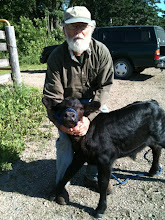Wow! Where have I been lately? I've missed pecking away at something swimming around in my head and turning it into concrete symbols like this blog. I've been reading Deep Ecology (2007) by Bill McKibben after reading Wes Jackson's latest book trying to figure out what my point is in day caring this soil on Blue Moon Farm. The point seems to come from within as there isn't much incentive from the outside to care for the carbon sink we call soil. Amazing what one realizes in reading some of this work by men and women who have the tenacity to dig, dig, dig into the works of others and their own curiosity to write for us.
Bill McKibben is one of those earthlings who's trying to make a difference with his pen or typewriter or keyboard. Thanks Bill. Personally I seem to be too lazy to dig up enough stuff myself to take a thesis to fruition. I like how Bill explained "Global Warming" in my near slumber reading event last night. Here's what he said: "(A gallon of gasoline weighs about six pounds, and when you burn it you release about five pounds of carbon into the atmosphere.) It accumulates in the atmosphere, creating almost a mirror image of the reservoir you drilled it from in the first place. Which is a problem, because the molecular structure of carbon dioxide traps heat from the sun that would otherwise radiate back out to space. That's all global warming is--the gaseous remains of oil fields and coal beds acting like an insulating blanket."
Pretty simple, Bill. I knew that, but not quite that simply. Crap, I get it when you put it like that. Given that we've supposedly passed the halfway point on burning our fossil oil and gas, mostly in the last 50 years, it kind of makes me wonder how the old atmosphere is doing cleaning up that CO2. Since matter is neither created or destroyed and I don't believe we're pumping much of that CO2 back in the ground I guess we're counting on vegetation around the planet to suck it up and photosynthesize it into plant matter and O2. Wow, we're saved. Ooops, forgot. We're cutting down the Amazon Rain Forest like a John Deere combine takes in wheat and soybeans near our farm in Becker County, Minnesota, and the gradual warming of the earth over the last decade or two is causing my woodlot to age faster and thus recycle faster and not take up so much CO2 as it used to (this is happening everywhere for the most part I suspect). And then, since we are turning our soil upside down every year to grow annual grains to feed the masses, we don't sequester so much carbon in the soil as we used to. In fact with the heavy rains we get in these more violent storms I'm sensing, there is surely more soil erosion going on now in America that there was during the Dust Bowl Era of the 20s and 30s.
OK. So we're converting our carbon reserves to CO2. So what? Well, so what is exactly what I'm doing on this farm. Growing food and I'm going to coach my kids to grow their own food or at least know how to do that. Yet, there are so many Catch 22s in this whole mess of carbon sinking, sequestering and converting I could write for hours and barely touch the surface of the complications we are facing in the direction we are heading with our "more is better" attitude or our "grow the economy" mindset we entrenched in our brains since WW II.
This crystal ball work is mind boggling. It's like predicting whether the Vikings have a chance at the Superbowl this year. Maybe it's too much like that. Our chance of changing our mind about when, where, what and why we use our fossil fuels and soil carbon for is about the same probability as the Vikings winning the Superbowl this year. Not! In the past we have learned to clean up our act by getting richer and applying our science to our pollution and "voila" rivers got cleaner, the air got de-sulphured, etc., but this carbon deal is trickier. Getting richer only causes more people to use more fossil carbon and turn more soil into annuals and erosion. Looks to me like we're in for some resilience training and for the first time in the history of humanity we're going to have to learn to live with less in some kind of near future or we'll be dry, hungry, and hot. We have gone to war in isolated skirmishes and regionalized world wars many times for many humanitarian and selfish reasons in the thousands of years of written history. I don't think we've ever gone to war because we didn't have the technology to solve a problem of fear over being too hot, too hungry and too dry or maybe too flooded before.
Bill McKibben
Better get out and check the cows I guess. Can't seem to fix this global warming issue in one blog. Anyway, it's been so cold here in Northwestern Minnesota this November I can't believe there is any global warming going on. There is that old saying you know, that if you can't fathom something you sure as hell aren't going to believe in it. I am anxious though for that new technology to come along and help the earth recycle our CO2 emissions before its too late. That technology is called poverty or at least a mutation in us humans that causes us to loose our ability to seek pleasure.
Walk more and keep the green side up.
Sunday, November 28, 2010
Subscribe to:
Posts (Atom)
